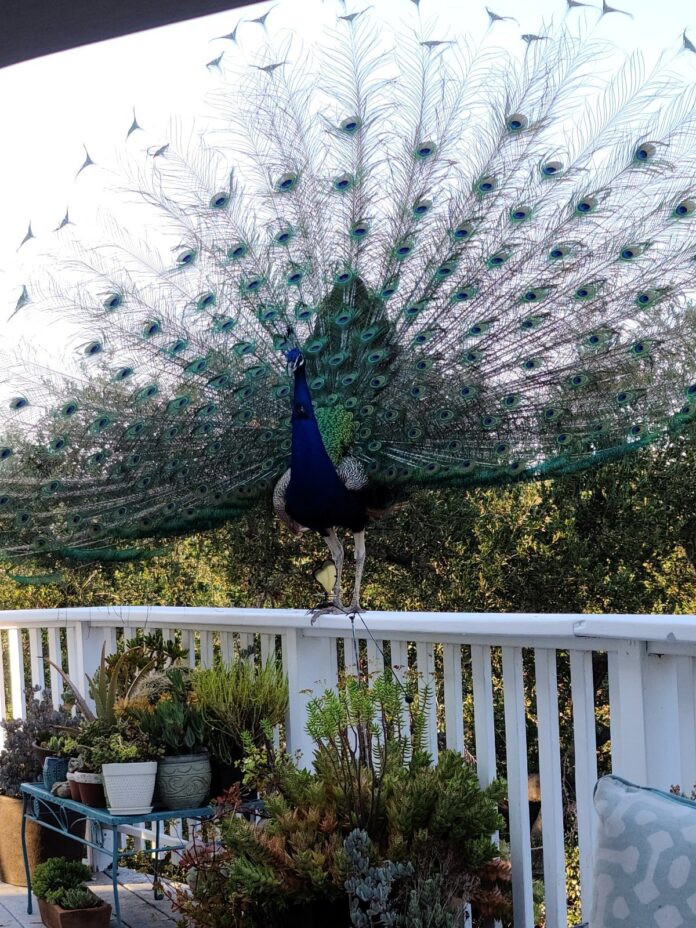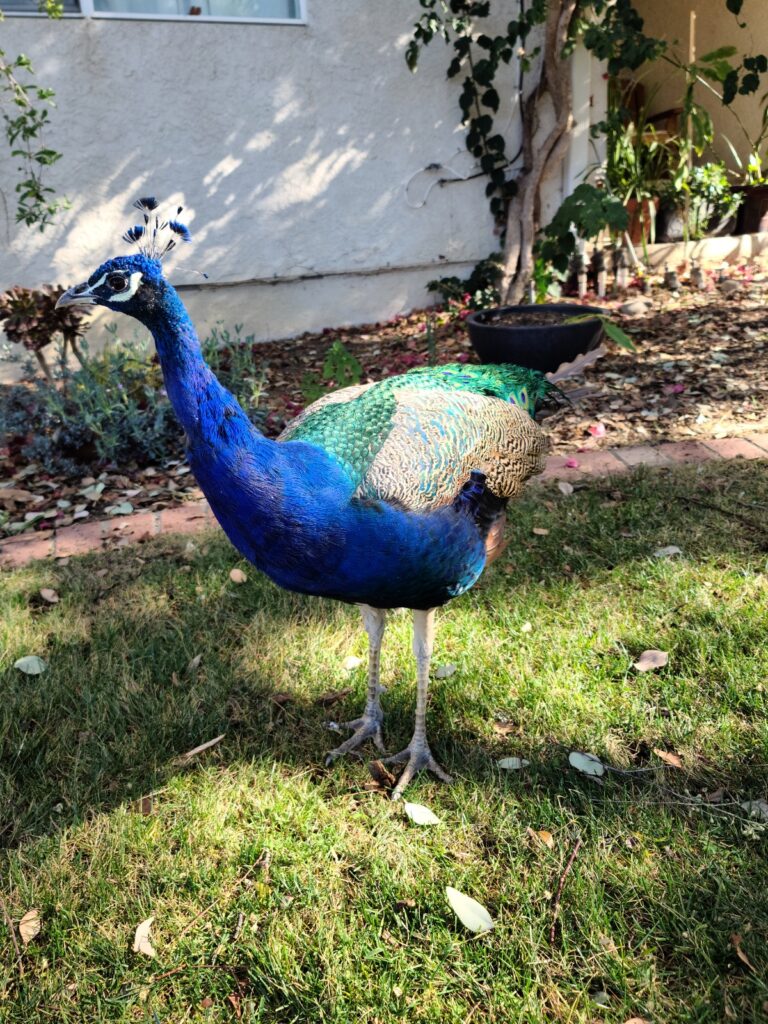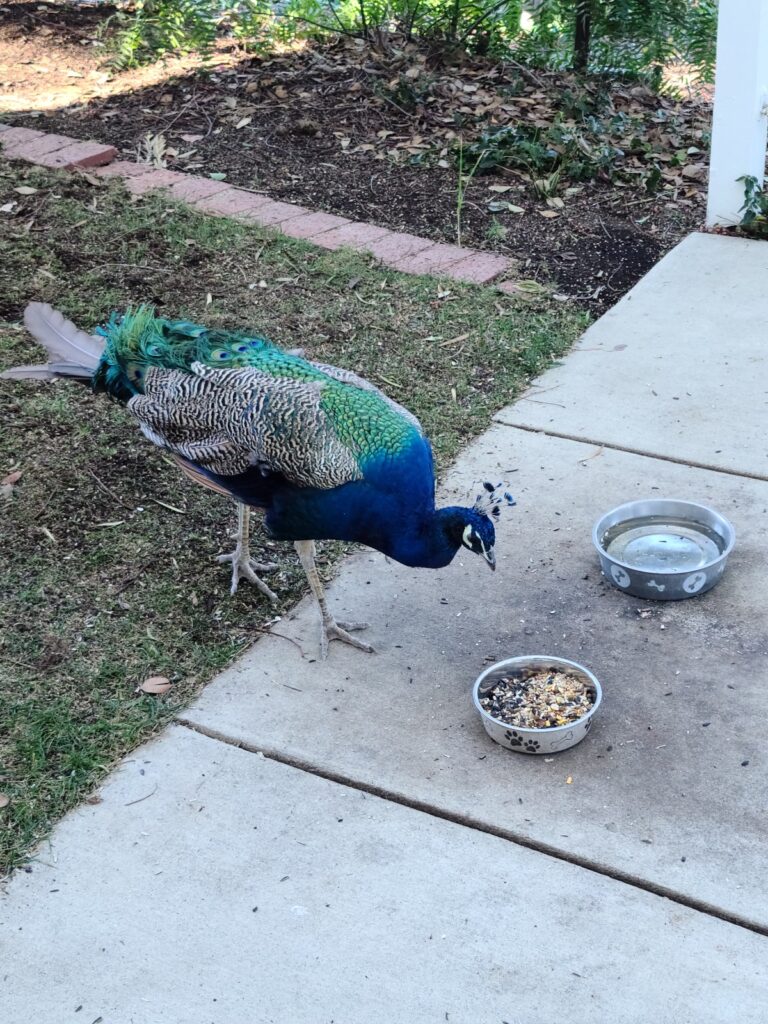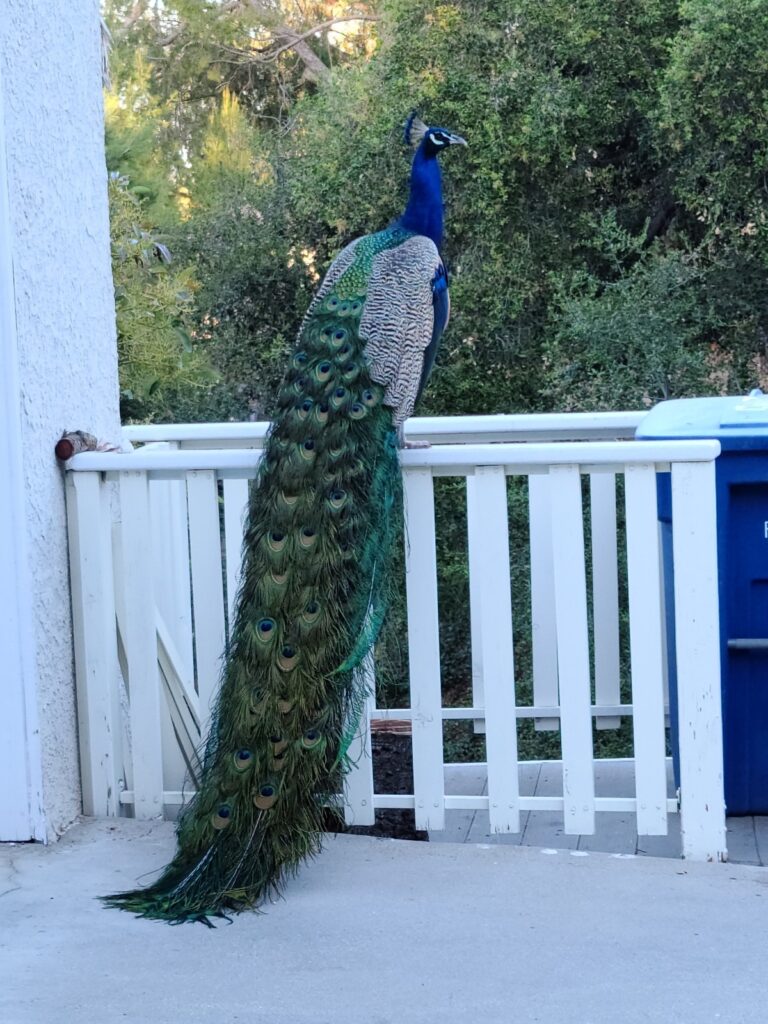They call him Tango. Or Kevin.
Six years ago on December 15, Newbury Park’s Clifford Wickham heard an unusual sound and discovered a peacock eating the squirrel food on his deck. The lone bird has made the neighborhood his home ever since.
“He would stop by every morning and in the afternoon for breakfast and dinner, and in the evenings he sleeps way up in a pine tree,” Wickham says. “[The kids] love him in the summer time, the adults love him. Everybody asks, ‘How’s Tango?’ ‘How’s Kevin?’ and so he’s sort of a fixture of the neighborhood.”
Neighbor Sandra Koven calls him “our neighborhood mascot.” She used to collect the bird’s feathers with her young children.
“My kids have totally grown up with him,” Koven told the Guardian.
Tango — the neighborhood kids call him Kevin — sleeps on the same bough every night roughly seventy-five feet up in a tree. In the morning, he glides all the way back down.
“He’s very cautious,” Wickham says. “You will see him shuffling and looking around and making sure there’s nothing around, and then it’s a leap of faith. He jumps, opens up this seven-foot wing span and you can hear him whoosh all the way to the ground.”
After a safe landing, he heads for one of the food dishes and picks out pepitas, dried fruit and other favored foods from the bowl. Tango’s diet consists of squirrel fruit and nut mix, wild bird seed, fresh fruit in the summer and Blue Mountain cat food which provides needed protein while his tail regrows. As the day gets hot, Tango sequesters himself in one of various refuges, climbing into an oak tree or parking himself under a bush until the late afternoon when he stirs for his afternoon meal.
“He’s reacting to pretty much everything around him — a squirrel going near his food, and sirens from the fire department or the backup noise that the Amazon Prime truck makes. He hates the UPS guy.”
“He’s got a slow gait,” Wickham says. “You can hear him, crunch, crunch, as he walks slowly through the oak leaves. I can hear him from quite a ways off, and then he comes up onto the deck, and has a little snack. … If I’m out doing emails, or writing or something, he’ll stay out there two to three hours with me on the deck.”
At sunset, the peacock eats his last snack, then sojourns into the backyard and across the Kovens’ property to his roost.
During the summer, Tango is most vocal and alert, and curious local kids spot him standing in driveways with his tail open against garage doors. He develops a loud call different than his year-round honk and his tail sounds like maracas when he displays and shakes the coverts.
“That squawk in the summer — it’ll carry a half a mile,” Wickham says. “I’ll be off on a hike somewhere, and I’ll hear him way off in the distance. … I think it’s some sort of a summer mating ritual, where he’s got his tail, he’s squawking, he’s reacting to pretty much everything around him — a squirrel going near his food, and sirens from the fire department or the backup noise that the Amazon Prime truck makes. He hates the UPS guy. … In the summer, when a fire truck goes by, no matter where he’s hiding, you’ll hear him.”
Koven cherishes the sound.
“Feels like I’m on a farm,” she says. “Instead of roosters, I’ve got this peacock that just goes nuts.”
Each fall, Tango molts his splendid tail and loses his demanding squawk, but the tail begins growing again in winter, and the squawk follows after the tail.
“His tail sounds like maracas when he displays and shakes the coverts.”
Wickham says peacocks have a poor sense of direction, so Tango mostly stays within a few hundred yards of his roost and close to reliable food. One day during a rainy spell, the beloved mascot disappeared, having been chased onto the neighbor’s roof by a coyote. A group searched for the fleeing bird to no avail. Tango remained lost until three worrisome and rainy days later when the Wickhams found the forlorn peafowl dragging himself down the street, colorful tail and all.
“His tail sounds like maracas when he displays and shakes the coverts.”
“We think he got lost,” Wickham says. “So we called for him, and he perked up, and he kind of walked over, had a snack, and then hopped up onto the tree, one of my smaller trees here, and dried himself off.”
Tango has become especially familiar with Wickham over the years, coming over for a sip when Wickham’s using the hose, following him around on occasion, and eating out of his hand.
The Wickhams and Kovens don’t know where Tango came from, but are delighted he decided to stay.
“He still takes my breath away,” Koven says. “If he’s walking, we slow down, take a picture. If he’s watching everybody while he’s perched on the fence, its like, we stop, take a picture. … He is God’s amazing creation, truly.”




